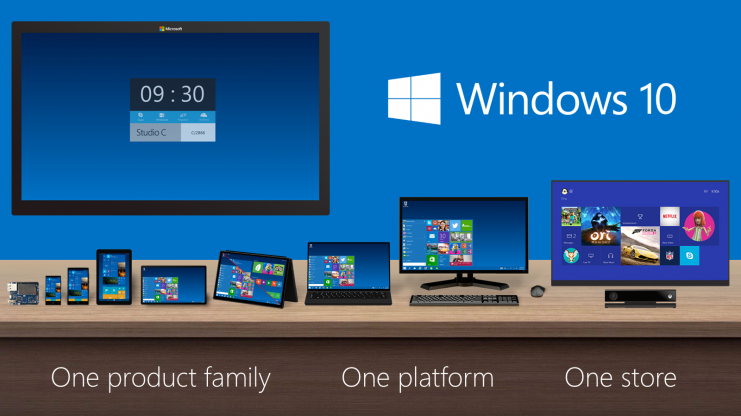For the past few years, top industry analysts have been predicting that PCs as we know them were dying, and with it PC gaming. Contrary to that belief, sales are stabilising according to the International Data Corporation’s (IDC) latest report, showing that shipments in the last quarter are better than expected.
Previously, it was projected that PC sales, including that of notebooks, desktops and workstations, were to decline by 1.4 percent year-over-year. This has in fact narrowed to a decline of 0.5 percent according to the IDC’s Worldwide Quarterly Personal Computing Device Tracker, totalling 67.2 million units sold in Q3 2017.
This shows tell-tale signs of market stabilisation, which is particularly noticeable in Europe, in which the IDC states an increasing interest in portability being the reason for the increase in purchases across the continent.

“With customers increasingly adopting a mobility mindset, notebooks were undoubtedly the drivers for the EMEA PC market,” stated the analyst. “Although desktops continued to erode, growing interest in gaming contributed towards keeping the desktop market afloat.”
This is particularly interesting given the recent boost in competition within the CPU and GPU market as AMD released its Ryzen, Threadripper and Vega lines of hardware. IDC’s program Vice President of Worldwide PCD Trackers, Loren Loverde stated that these “component and inventory adjustments” alongside “emerging markets rebounded slightly more than anticipated, but overall results reflect the stabilisation we expected.”
Loverde continued to exercise caution while moving forward, however, stating that “the gains in emerging regions and potential for more commercial replacements represent some upside potential, although we continue to expect incremental declines in total shipments for the next few years.”
KitGuru Says: It seems to me that signs of PC hardware sales slowing down is simply because there hasn’t been enough of an improvement year-by-year on components or complete builds to justify the cost of an upgrade. Many people are kitted out with devices that will last them years, with incremental upgrades pandering to the enthusiast in us rather than being as necessary as it used to be. That being said, do you plan to upgrade soon?
 KitGuru KitGuru.net – Tech News | Hardware News | Hardware Reviews | IOS | Mobile | Gaming | Graphics Cards
KitGuru KitGuru.net – Tech News | Hardware News | Hardware Reviews | IOS | Mobile | Gaming | Graphics Cards



Cue typical PCMR member oblivious that most people don’t need the power available in modern desktop systems while denying average people migrate away just because they are proud of their system.
But this isn’t about you, overall global system sales are not from gamers or enthusiasts. The article states 67 million system sold last quarter, which is about the most number of Steam accounts in existence, so about 75% of the global market aren’t gamers. Even most Steam accounts don’t get high-end or upgrade often to game on.
Considering those that get most offensive over PC decline news, it comes off as an insecurity when you react as if your system is going out of style. No one is saying that, but you don’t like doom and gloom news over PC when most folks are happy with the power in most smartphones in their lives.
otoh, anecdotally, but it rings true, the mobility thing has been over sold to folks.
We do mobile on our phones now. At work or at home, we want some thing decent, not a compromise to mobility we dont need.
The problem is not power, the problem is most websites still aren’t optimized for mobile, the problem is even the ones that are optimised often leave out features or information that the desktop version has, the problem is it takes more time to do anything on a smartphone than in any fully fledged PC, the problem is I can’t see half the detail of an image looking through the 1440p display of a phone than what I can see on a 1080p monitor simply because it’s too small for my perfectly good human eyes to make up the detail, the problem is it takes more time to find an information on my smartphone than it takes on my PC…
You see, smartphones are just plain inconvenient when compared to the full experience. Of course I’d rather have an smartphone than nothing and there are things way more convenient on a smartphone such as being able to do things like playing music and taking photos anywhere I am even without my specialised equipment for that but it’s still not the real deal.
Smartphones are great substitutes to basically anything when you don’t have that specific thing near you but they’re never better than the real thing I still take my camera with me when I travel and I’m pretty sure most people that has a decent camera also do, it’s just better, I also prefer to manage my music in a fully fledged PC program than any mobile app, it’s just better and faster, but not because my PC’s CPU is faster but because I can interact with it faster and with less errors. Yet I will take my phone with me to complement all of those experiences by remote controlling foobar2000 or sharing the photo I just took, the problem is people think if they buy an expensive enough smartphone it will work as well as the real thing and thus they spend a thousand on an Iphone X and that’s so expensive they don’t have any money left to buy the real thing and thus they never notice it’s not as good.
As always those data only capture the OEM system sells and not the custom market.
I don’t have any idea how big the custom market is but I don’t know a single person who is playing games and buy an OEM system to cover his needs.
Also where I live we have well established a culture of gaming pcs are only the custom pcs so there are a lot of market guides to build anything, from ultra budget gaming pc to the ultra strong “money is not an issue” system. So I have never seen anyone to suggest or even ask to buy an OEM system to play games (some stupid marketers only, who suggested i7 with intel HD4400 was a gaming system…)
This for the gamers, since it is mentioned that the pc gaming is dying (steam suggest otherwise…)
As for the people who will buy OEM systems and not turn to mobile ones, they really are either a small niche market that need powerful workstations that they will keep for 2-3 years and they will switch as soon as they see them slow down the workflow (and the only ones who actually make the market of OEM move) or the big market of OEM system for office work.
Those system doesn’t need constant upgrading, they run fine the office applications even with a 10 years old entry level CPU, they only get replaced when they die and hardware lifetime is way longer than you may expect.
(because we upgrade fast following the gaming needs, we don’t understand how long our hardware can keep working, my Ati 4850 still play games after all those years in a system I build with leftover hardware for my parents, mind you this card is on active duty for almost 10 years and keep going)
You can see this in the adoption rates of windows, those low rates are not the me and you that love older windows so much, those are the OEM systems in offices that still work the somewhat simple tasks and doesn’t support newer versions of windows (or there are simple no drivers for the hardware) but those systems still get the job done, so the companies can’t justify the cost to buy new systems that will barely make any noticeable difference in their workflows, also it is a matter of compatibility with the rest of their infrastructure. So they don’t buy often and at the moment the market is just saturated.
The crazy sales from other years where just those companies who where moving into new systems from older ones or just moving their workflow into computers for the first time. While in our consumer eyes this change was fast, for the big companies it is not, it take decades to complete some transitions and in the meantime they buy OEM systems slowly. But now this is at a halt, they have what they need and they just keep the market afloat with replacing the failing systems. They no longer need to do massive buys, there is not any big change to force them to move from their current computers. You can have a network with a system running windows XP, another with vista, another with 7/8/10 and all be happily working together (I do this myself).
It is not like they where in DOS and suddenly there are windows with way more usable computers, we are at the peak point and from there on we keep getting improvements, nothing really ground breaking.
Even the smart devices does not give anything unique in reality, they just moved the pc in the pocket, sure this is a big deal for many people but it is not a reason for let’s say, a company to scrap their computers and move their workflow on tablets or something.
We have just reached a peak, I know we can go higher but at the moment I work and play fairly good with an ancient phenom II x6, and I’m at the low end, there are systems out there with hardware 3-4 times stronger than mine and they are just fine with that and they will be for at least 5 more years.
The only think that I have upgraded the last few years is the GPU and I added more RAM and a SSD drive.
PC CPUs where on halt, and not 5% per generation with the intel CPUs was not a big deal.
Only this year I felt that finally we are moving forward when I realized that the cheap ryzen 1300X is 2 times stronger than my CPU at a price that everyone can afford and both amd and intel are moving forward after years of being stagnant.
So stagnant that Apple is developing ARM chips strong enough to power their entry line of macbooks!
Anyway it seems that now things are on the move again, so it will be interesting to see those figures again in a year from now. I don’t expect much to change (as I explained above) but the upgrade craze in the custom builds can bust the OEM sales as well, consumer wide at least.
If they don’t then maybe it will be final.
The gamers will be the last stronghold of pc hardware, the average Joe have moved to tablets/smarthones and the OEM sales only exist because companies still buy computers.
Boy I do really miss writing 😛